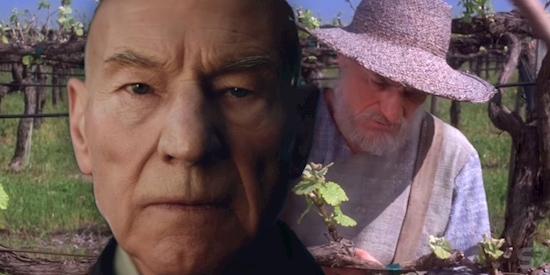Star Trek: Picard Shouldn’t Use The Next Generation's Memory Loss As A Plot Device
Star Trek: Picard takes place a quarter of a century after the events of "All Good Things," and while there are reasons to think the story might not head this direction, it's possible the series will address the onset of Irumodic Syndrome that was foreshadowed in TheNext Generation series finale. But the thing is, it shouldn't. After seven highly successful seasons, Star Trek: The Next Generation ended its historic run with one of the most critically acclaimed series finales in TV history. The two-part episode bounced between the past, present, and future as a temporal paradox through Jean-Luc Picard, featuring different periods of his life.
Click the button below to start this article in quick view. Start nowThe paradox appeared in all three time periods - one taking place during the pilot episode "Encounter at Farpoint," one in the present, and one decades into the future after his retirement. But when the present-day Dr. Crusher runs a neural scan to find out what's wrong, she discovers a defect that could lead to a dementia-like neurological disorder called Irumodic Syndrome. She explains it's possible that he won't develop any symptoms, but we already know from our visits to the future that he eventually does, thus making his "time travel" even more unbelievable to old friends and family. While we ultimately learn that Picard is indeed suffering from temporal interference at the hands of the anomaly (and Q), he doesn't end the episode minus the defect that could eventually lead to him developing Irumodic Syndrome at a later date.
Given the era in which Star Trek: Picard takes place, not to mention the disillusioned Picard we're told will appear, it's not entirely without the realm of possibility that his disillusionment stems from a degenerative disease that's rearing its ugly head. It's slightly telling that the first teaser showcases Picard in his vineyard, obviously having retired to the family estate after leaving Starfleet 15 years before. When we first encounter him in the future in "All Good Things," that's exactly where he is, tying his vines when Geordi walks up, 25 years after their time on the Enterprise. But despite how much the timing lines up, hopefully Star Trek: Picard has decided to engage with a different future for one of Trek's most illustrious figures.
The idea of giving as towering a mind as Jean-Luc Picard a degenerative neural disease upped the stakes of "All Good Things" astronomically. The episode wasn't just about the Enterprise trying to solve yet another puzzle but also about Picard facing the only final frontier that ever truly frightened him. To borrow from Q, he faced the unknown possibilities of his own existence, and had to find the strength to press on in the face of it - not unlike Christopher Pike when he discovers his gruesome fate on Star Trek: Discovery. But the idea of Picard's tragic future was a device that worked well within the context of "All Good Things," but it feels a little too hopeless and pessimistic for Star Trek: Picard to add to its already dour outlook. It could still happen, but introducing it into a series that's already operating on the premise that Picard's disillusioned for a totally different reason feels less Star Trek and more Sopranos. Also, the subsequent TNG films make absolutely no mention of the possibility of Picard developing the disease, so it could be something that the writers intended only for use in the finale.
That makes sense considering one of the major themes of "All Good Things" was the denial of predetermination, no matter what any temporal anomalies might show us. When Beverly expresses her concern that Picard already knows he's going to get Irumodic Syndrome from his trips to the future, he says he doesn't look at the future as "something that's not set in stone." After the debacle is over, Data points out that, since the anomaly technically hadn't happened in that timeline, said timeline was already different. Riker responds with, "Maybe that's why he told us. Knowing what happens in that future allows us to change things now, so that some things never happen." He's speaking more to his future falling out with Worf, but the message is clear. Even within canon, under the illusion that writers don't have the power to manipulate the lives of these characters, the future is still unknowable.
Ultimately, it's possible that Star Trek: Picard will address the potential for Picard to develop Irumodic Syndrome, and the possibility gets more and more likely the longer the show stays on the air. But from what we understand, Picard's already dealing with isolation and cynicism in his retirement the likes of which we've never seen from him before. Giving such a beloved character that and the grim future Irumodic Syndrome promises might be heartbreaking enough to alienate audiences in the extreme.
Source: screenrant.com

